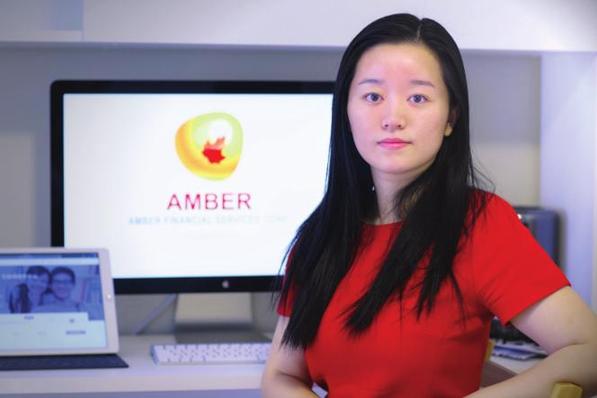Riding the ‘fintech’ wave in Vancouver
Updated: 2016-04-30 02:35
By HATTY LIU in Vancouver(China Daily Canada)
|
||||||||
 |
|
Vancouver entrepreneur Cindy Chen, who founded Amber Financial Services at age 29, says she wants to globalize her services for the coming “fintech” boom. RYAN CHEUNG / FOR CHINA DAILY |
Forget Toronto: financial entrepreneur Cindy Chen, founder and CEO of Vancouver's Amber Financial Services, believes Vancouver is gearing up to be Canada's new hub of enterprise and innovation. All it needs is a bit of local support services to seal the deal.
Having set up her company last year, Chen, 29, who has experience living in three countries, seems ready to lead the way in the transformation.
"Vancouver has always been known for ‘living' and Toronto for ‘working,' but it's incredibly clear to those who live here that this has started to change in the last couple of years," she told China Daily. "The city attracts people from around the world with deep industry experience and energy to burn, and all they need is some help overcoming the language and a few other barriers."
Amber Financial makes two claims to uniqueness: it is one of the first Canadian companies involved in the budding financial technology — or "fintech" — industry; and it is tailoring its services to overseas Chinese clients.
The company's fintech focus is mostly in pioneering methods to aggregate data to assess loan applicants whose credit or income history may be based in another country or who may come from a country without a well-established credit-rating system.
"In Europe, in the US and even in China, the fintech industry has seen a lot of growth, while Canadian financial institutions on the whole are conservative and operate with traditional models," Chen said. "Financial services are monopolized by five major banks and their practices don't meet the needs of atypical, global clients."
As an example, Chen brought up the fact that women are statistically less likely to default on loans, and this can be a factor in the model built of a potential loan client.
"We are careful about quality control," she said. "There are companies in the fintech industry, in China for example, for whom making financial services more accessible means giving out loans to lower-quality clients."
"Our goal is to find technological and big data solutions that combine quality with accessibility," she added.
The focus on overseas Chinese clients is in direct response to the constraints that Chen saw in the traditional banking system. She believes it is atypical clients like these who will increasingly become the norm in a global economy and in cosmopolitan cities like Vancouver.
Young applicants, including students, are another atypical client category served by Amber Financial.
"I've found that students typically have good family resources back home and they may be very good students on scholarship, but there isn't an efficient way to assess that, and those are the things we look at," Chen said.
"In China, there are already financial services for overseas students but they are unsystematic and there's a lot of bad credit, it's far below the level of service offered by traditional financial services."
Chen has also heard from parents in Chinese-Canadian as well as Filipino-immigrant communities who "want their children to build up a good credit score as soon as possible when they come to study or live [in Canada], and that's something else we can do, starting with small loans."
"It's our ultimate goal to connect the credit systems of different countries and allow everyone to live as global citizens," Chen said. "I was once an international student from China, dealing with an unfamiliar system in a new country. On our team we have people who've had, or know those who've had, challenges with traditional financial services in Canada. These are the people who make up today's world."
Educated at Fudan University in Shanghai and later at Washington University in St Louis, where she worked as a lab manager marketing and organizational behavior research, Chen briefly considered a career in research before family circumstances brought her to Vancouver.
Though she came to it almost by accident, she said she has been struck not only by Vancouver's beautiful natural environment and international connections, but also by its untapped potential.
"I've met so many hardworking, experienced, incredibly energetic people," she said. "These people may be leaders in their home country and have a passion for work, but because of their unfamiliarity with the language or customs in Canada, they're not finding the best channels for their abilities. This is going to change."
Chen herself is no stranger to the challenges of doing business in a new city. One of the struggles she continually meets as an entrepreneur is assembling a qualified team to carry out the company's vision.
"Working in the fintech frontier and in any kind of start-up, you face new challenges, and you need to be able to learn and apply what you've learned before," she said.
Over the past year, Chen has assembled a diverse team of 18, including engineers from IBM, experienced bankers from BMO and CIBC, and other entrepreneurs.
"There is still room to grow: sometimes we have ideas that our technical resources haven't caught up to yet, so we need to find solutions over time," she said.
Apart from being a young entrepreneur, Chen also is a new mother and considers herself "extraordinarily lucky to have family support."
"It lets me do the work I do, and I'm always finding new things to do, new improvements to devote myself to," she said. "But I don't feel like I'm living under pressure — my team is excellent, every one of us is trying something new and learning about ourselves, and it's a happy process."
"Vancouver has a unique place in North America: a wonderful environment and global connections attracting the best people from around the world. Young people, as well as older immigrants who have been here for years, have an energetic and hands-on approach to life — and each of them certainly has special skills and qualities to contribute.
"Hopefully our finance and infrastructure can keep up with them," she said.
Yuji Zhang contributed to this report.
- UN urges DPRK to stop 'further provocative action'
- China stresses Putin's expected visit
- British FM visits Cuba for 1st time since 1959
- Trump attacks Clinton on gender, risking backlash from women
- Pirate radio poses surprising challenge in internet age
- DPRK's Musudan missile launch appears to have failed

 Top 10 luxury cars at the 14th Beijing auto show
Top 10 luxury cars at the 14th Beijing auto show
 European castle-style campus wows in Southwest China
European castle-style campus wows in Southwest China
 Industrial city reinvents itself as green oasis
Industrial city reinvents itself as green oasis
 Tiananmen Square decorated as May Day holiday approaches
Tiananmen Square decorated as May Day holiday approaches
 Snapshots of modern-day Chinese at work
Snapshots of modern-day Chinese at work
 Top 10 dazzling new car models at Beijing auto show
Top 10 dazzling new car models at Beijing auto show
 London's Big Ben to fall silent for urgent repairs
London's Big Ben to fall silent for urgent repairs
 Rare snub-nosed monkeys at Beijing Zoo
Rare snub-nosed monkeys at Beijing Zoo
Most Viewed
Editor's Picks

|

|

|

|

|

|
Today's Top News
Liang avoids jail in shooting death
China's finance minister addresses ratings downgrade
Duke alumni visit Chinese Embassy
Marriott unlikely to top Anbang offer for Starwood: Observers
Chinese biopharma debuts on Nasdaq
What ends Jeb Bush's White House hopes
Investigation for Nicolas's campaign
Will US-ASEAN meeting be good for region?
US Weekly

|

|







